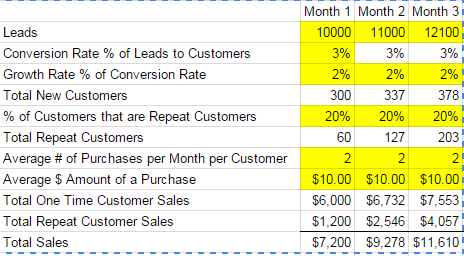Retail Sales Financing | 1st Franklin Financial
Make it easier for your customers to get what they want.
Have you lost sales because of your customer's inability to pay in full, but offering financing yourself is cumbersome and unfeasible? Retail financing with 1st Franklin Financial is the answer to boosting your sales by helping your customers afford what they want.
With our retail financing services, you can accept applications on-site and send them to the professionals at 1st Franklin Financial for an immediate decision. Your customers can take home their purchase without having to visit our loan office!

When you team up with 1st Franklin Financial, you create the perfect partnership for growth. Our financial strength and longevity allows us to create tailored retail finance programs to suit each unique business. But what exactly does this mean for you?
With our retail sales financing programs, you can enjoy:
Increased customer loyalty. People shop where they feel comfortable. When you offer your customers no-hassle financing options, they will return again and again.
Relief from delinquencies. By leveraging our retail finance services, you are relieved of delinquency losses on accounts receivable that might otherwise be absorbed by your business.
High customer approval rate. While other companies require a minimum credit score, we evaluate each credit application individually, allowing us to approve many instantly and others in a very timely manner.
Resources to dedicate to other initiatives. When you don't have to worry about collections and bookkeeping, you can dedicate that time and money to business development.
Best of all, our retail finance programs are backed by the 1st Franklin Financial name--a company that has been helping neighbors across the southeast since 1941.
All loans subject to our liberal credit policy and limitations, if any. 1st Franklin Financial Corporation, NMLSR #141654. Georgia Residential Mortgage Licensee #5656. Licensed by the Mississippi Department of Banking and Consumer Finance.
http://www.1ffc.com/retail-sales-financing/
Availing Small Business Start Up Loans
Business firms avail loans for financing start ups by approaching lenders, like banks and credit unions, who decide on the prudence of the investment based on the following factors. They evaluate the loan application and decide on conventional business financing, that does not require a Small Business Administration (SBA) guarantee, provided the borrower is deemed creditworthy. In case the applicant's credit history is not up to the lender's credit standards, the financier would require an additional guarantee, the absence of which would disqualify the borrower from obtaining the loan. The American Recovery and Reinvestment Act of 2009 was instrumental in the US Small Business Administration (SBA) temporarily eliminating administrative fees and raising the level of guarantee on some of its loans. These steps have been taken to provide lenders with the security necessary to accelerate the process of disbursing loans to millions of business owners who are in desperate need of capital. The reason for the meltdown in lending, was on account of the lending institutions being unable to securitize their loans. Securitization is the process of pooling loans together and issuing securities with the underlying pool of loans acting as the collateral. These securities are purchased by investors who receive income from the interest and principal payments made by the borrowers. Securitization increases the lending power of the banks by freeing up funds. However, over time, the liquidity in the secondary markets declined since the securitizing institutions were unable to find buyers for investments backed by the pool of debts. Hence, banks who depended on the secondary markets for liquidity became hesitant in extending credit to small businesses. The American Recovery and Reinvestment Act of 2009, tackled this problem by providing assurance, that the government would purchase 7(a) and 504 first-lien securities, which were backed by the popular SBA loans that promulgated small business start up loans.
Start Up Loans for Small Business Entities
7(a) Loan
SBA guaranteed 7(a) small business start up loans are meant for borrowers interested in starting a business, expanding, or acquiring small business entities. The typical applicant lacks the necessary collateral to clinch a loan and has insufficient equity to start the enterprise. The maximum amount of SBA guaranteed 7(a) loan that can be availed by a borrower is around USD 2 million, and the SBA guarantees up to 75% of the amount of the loan. Administrative fees, on processing the loan, have been eliminated on loans originated on/after February 17, 2009, with retrospective effect. Lenders, who have been approved to participate in SBA lending programs, are eligible to provide SBA guaranteed small business loans. People operating a home-based business can apply for this loan provided they meet the standard eligibility and credit criteria.

Micro-Loans
These loans are provided to start ups, newly established, or growing small business concerns by nonprofit intermediaries who receive funds from the SBA. The amount of money that can be provided as a micro-loan cannot exceed USD 35,000. On an average, the money lent to a borrower is to the tune of USD 13,000. The borrower is expected to submit applications to the local intermediary who decides on the prudence of advancing money to the aspiring entrepreneur.
504 Certified Development Company Loans
These loans are meant for expanding small business enterprises by offering long-term, fixed-rate financing for the purchase of fixed assets, viz. land, building, machinery, and equipment. The borrower brings with him/her a small amount of equity while the remaining portion is shared between the bank/primary lender, and a certified development company (CDC). The portion of the loan from the CDC comes with a SBA guarantee for loans not exceeding USD 4 million.
SBA-backed loans are generally provided to services, retail, accommodation, food, construction, and manufacturing industries. These loans are geared towards helping minorities and women-owned businesses become self sufficient, and successful enterprises that benefit the society by generating employment.
http://www.buzzle.com/articles/small-business-start-up-loans.html